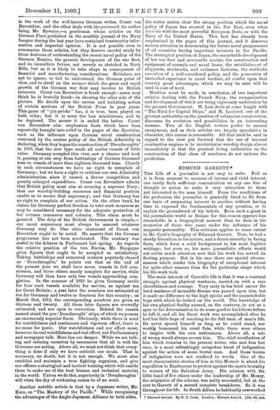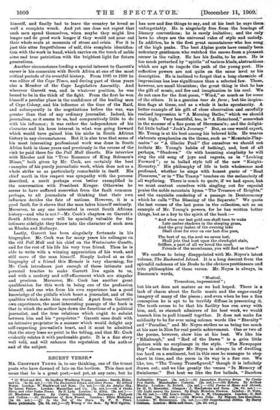EDMUND GARRETT.*
THE Life of a journalist is not easy to write. Full as it is from moment to moment of intense and vivid interest, one rarely finds sufficient concentration on any one line of thought or action to make it very attractive to those not interested in the man himself. From the conditions of his profession, the journalist is generally fated to flit from one topic of surpassing interest to another, without having time to expound the fundamentals of any question, or to explain the groundwork of his beliefs. Even such a giant in the journalistic world as Delane for this reason appears less remarkable in a biographical memoir than he does in the memories of those who came under the influence of his magnetic personality. This criticism applies to some extent to Mr. Cook's biography of Edmund Garrett. True, he bad a sturdy liberalism in his nature, and a direct sincerity in facing facts, which form a solid background to his most fugitive writings; but even so, his mere journalistic efforts would not excite much attention now that his work has served its fleeting purpose. But in his case there are special circum- stances which render this biography of exceptional interest for quite other reasons than for the particular shape which his life-work took.
The main interest of Garrett's life is that it was a. constant
struggle against physical weakness, carried on with a rare cheerfulness and courage. Very early in his brief career the hard sentence of incurable disease was passed upon him, but it made no difference to the high spirits and the unquenchable hope with which he looked on the world. The knowledge of his own physical frailty seemed, on the contrary, to act as a spur to his determination to do some good to his fellows before he left it, and all his finest work was accomplished after he had but little hope of reaching to the full term of man's life. He never spared himself as long as he could stand, nor weak* bemoaned his cruel fate, while there were others to inspire with his own enthusiasm. Above all, a tale of wrong would always arouse him. The chief recollection of him which remains to the present writer, who met him but once, is a most refreshingly outspoken burst of indignation against the action of some brutal man. And these bursts .of indignation were not confined to words. One of the most characteristic stories of him in this Memoir is, about his expedition to Eastbourne to protest against the mob's brutality to women of the Salvation Army. His mission with the little band of five others under the leadership of Mr. Money, the originator of the scheme, was nobly successful, but at the cost to Garrett of a second complete breakdown. So it was • throughout his life. In South Africa he habitually overworked
• Edmund Garr*. By E T. Cook, London: Edward Arnold. [108. 'ea." net. himself, and finally had to leave the • country he loved so well a complete wreck. And yet one does not regret that such men spend themselves, when maybe they might live longer and do good work longer if they would not pour out their whole souls at moments of stress and crisis. For it is just this utter forgetfulness of self, this complete identifica- tion with the work in hand, which carries on the torch of noble aims and true patriotism with the brightest light for future generations.
Another circumstance lending a special interest to Garrett's career is his connexion with South Africa at one of the most
critical periods of its eventful history. From 1895 to 1899 he was editor of the Cape Times, and during part of those years also a Member of- the Cape Legislative Assembly. And wherever Garrett was, and in whatever position, he was bound to be in the thick of the fight. From the first he won himself a peculiar place in the confidence of the leading men of Cape Colony, and hie influence at the time of the Raid, and subsequently in the negotiations before the war, was greater than that of any ordinary journalist. Indeed, his journalism, so it seems to us, had comparatively little to do with his influence ; it was rather the independence of his character and his keen interest in what was going forward which would have gained him his niche in South African history in any circumstances. But it is also true that some of his most interesting professional work was done in South Africa both in those years and previously in the course of the visit he paid there for the Pall Mall Gazette. His interview with Rhodes and his "True Romance of King Solomon's Mines," both given by Mr. Cook, are certainly the best examples of his purely journalistic work, which does not as a whole strike us as particularly remarkable in itself. His chief merit in this respect was sympathy with the persons described, a merit perhaps even better exemplified in the conversation with President Kruger. Otherwise he seems to have suffered somewhat from the fault common perhaps, to all journalists of thinking that their own influence decides the fate of nations. However, it is a good fault, for it shows that the man takes himself seriously. Moreover, to any one interested in recent South African history—and who is not P—Mr. Cook's chapters on Garrett's South African career will be specially valuable for the intimate sidelight they throw into the character of such men as Rhodes and Hofmeyr.
Lastly, Garrett has been singularly fortunate in his biographer. Mr. Cook was for many years his colleague on the old Pall Mall and his chief on the Westminster Gazette, and for the rest of his life his very true friend. Thus he is able to write with a winning appreciation of his work, and still more of the man himself. Simply looked at as the biography of a friend this Memoir is very charming, for Mr. Cook introduces just enough of those intimate and personal touches to make Garrett live again to us, and with a modesty and sell-effacement which are singular and precious. Moreover, Mr. Cook has another great qualification for this work in being one of the profession himself, and one who from his own experience has a good knowledge of the pitfalls which beset a journalist, and of the qualities which make him successful. Apart from Garrett's own experiences, the most interesting passage of the book is that in which the author lays down the functions of a political journalist, and the true relations which ought to subsist between him and his "proprietor." Garrett once dealt with an intrusive proprietor in a manner which would delight any self-respecting journalist's heart, and it must be admitted that the story loses no point in the telling, and that Mr. Cook evidently relates it with pardonable gusto. It is a fine story well told, and wia enhance the reputation of the auth or and of the subject.

























































 Previous page
Previous page